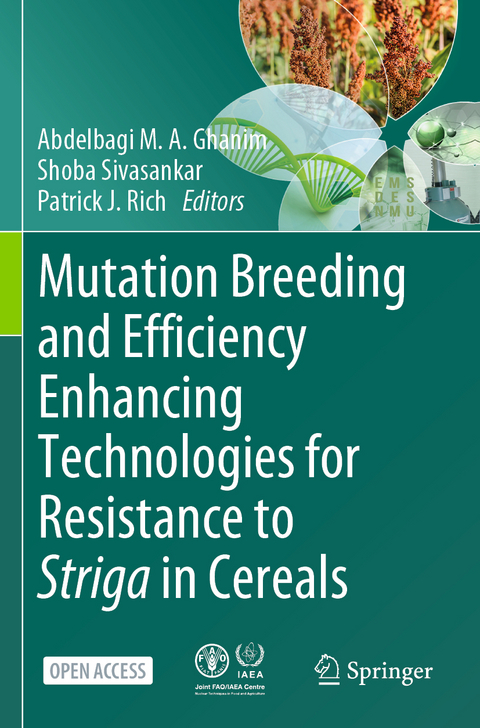
Mutation Breeding and Efficiency Enhancing Technologies for Resistance to Striga in Cereals
Springer Berlin (Verlag)
978-3-662-68183-1 (ISBN)
Abdelbagi M. A. Ghanim is an experienced plant breeder with focus on cereal breeding and related efficiency-enhancing technologies for rain-fed and irrigated dry lands. He served as the Project Officer and Technical Coordinator of the five-year IAEA coordinated research project on mutation breeding for resistance to Striga in cereals. This was during his tenure as Plant Breeder and Geneticist at the Plant Breeding and Genetics Laboratory of the Joint FAO/IAEA Centre in Seibersdorf, Austria. Prior to this role, he served as Research Professor at Agriculture Research Corporation in Sudan. Ghanim has released and registered six varieties of wheat and cotton as main contributor and five varieties of wheat and watermelon as a collaborator. He has a PhD in Plant Breeding and Genetics from the Faculty of Agriculture, Tottori University, Japan, and MSc from the Faculty of Agriculture, University of Khartoum, Sudan. Ghanim was also a Japan Science and Technology Postdoctoral Fellow at the Japan National Research Centre, Tsukuba. Shoba Sivasankar has 30 years of experience leading and managing international agricultural R&D programs. She is currently the Head of Plant Breeding and Genetics at the Joint FAO/IAEA Centre of Nuclear Applications in Food and Agriculture and is based in Vienna, Austria. Prior to this, she was global Director for two CGIAR Research Programs, Dryland Cereals and Grain Legumes, and successfully led the design and merger of the two into a multimillion-dollar mega-programme involving eight international (CGIAR) centres. Before this she coordinated the maize transgenic pipeline for agronomic traits from discovery research to early product development at DuPont Pioneer, now Corteva, at its headquarters in Iowa, USA. In this role, she provided leadership for discovery research in Australia, China, India, Japan and at Wilmington, Delaware, and early product testing in the Americas. This included candidate gene discovery, genetic associations, high-throughput vector construction/plant transformation and high-throughput phenotyping. During her career at DuPont Pioneer, Shoba also managed her own laboratory on stress physiology and digestibility and provided leadership for the establishment of DuPont’s high-throughput phenotyping platform. Shoba is inventor in more than 100 patent applications, has authored several peer-reviewed publications, and edited books and special issues of journals. She did her PhD and post-doc at the University of Guelph, Canada, and MBA degree at the University of Iowa, USA. Patrick J. Rich isa sorghum geneticist specializing in Striga resistance. He works at the University of Purdue in the laboratory of the 2009 World Food Prize Laureate, Gebisa Ejeta. Rich and his colleagues have identified several genes in sorghum controlling forage quality, drought and Striga resistance. He has received grants from the Bill and Melinda Gates Foundation, the International Atomic Energy Agency of the United Nations and the Rockefeller Foundation supporting his work on resistance to the parasitic weed Striga. Rich has co-authored 32 peer-reviewed publications, including 7 book chapters. His works have been cited in over 1000 publications. He received his Ph.D. in Plant Physiology from Purdue University.
Striga as a constraint to cereal production in sub-Saharan Africa and the role of host plant resistance.- Physical mutagenesis in cereal crops.- Screening for resistance to Striga hermonthica in mutagenized sorghum and upland rice in Burkina Faso.- Mutation breeding for resistance to Striga hermonthica in sorghum and rice for sustainable food production in Sudan.- Phenotyping for resistance to Striga asiatica in rice and maize mutant populations in Madagascar.- An agar-based method for determining mechanisms of Striga resistance in sorghum.- Histological analysis of Striga infected plants.- Striga germination stimulant analysis.- Identification of closely related polymorphisms with Striga resistance using next generation sequencing.- Rapid cycling and generation advancement for accelerated mutation breeding in sorghum.- Anther culture of rice for accelerated development of doubled haploid Striga resistant germplasm.
| Erscheinungsdatum | 11.01.2024 |
|---|---|
| Zusatzinfo | X, 182 p. 96 illus., 93 illus. in color. |
| Verlagsort | Berlin |
| Sprache | englisch |
| Maße | 155 x 235 mm |
| Gewicht | 302 g |
| Themenwelt | Naturwissenschaften ► Biologie ► Botanik |
| Naturwissenschaften ► Biologie ► Genetik / Molekularbiologie | |
| Weitere Fachgebiete ► Land- / Forstwirtschaft / Fischerei | |
| Schlagworte | mutagenesis in cereals • open access • protocols • rice mutant populations • Striga asiatica • Striga hermonthica • Striga infected plants • witchweed |
| ISBN-10 | 3-662-68183-8 / 3662681838 |
| ISBN-13 | 978-3-662-68183-1 / 9783662681831 |
| Zustand | Neuware |
| Informationen gemäß Produktsicherheitsverordnung (GPSR) | |
| Haben Sie eine Frage zum Produkt? |
aus dem Bereich


